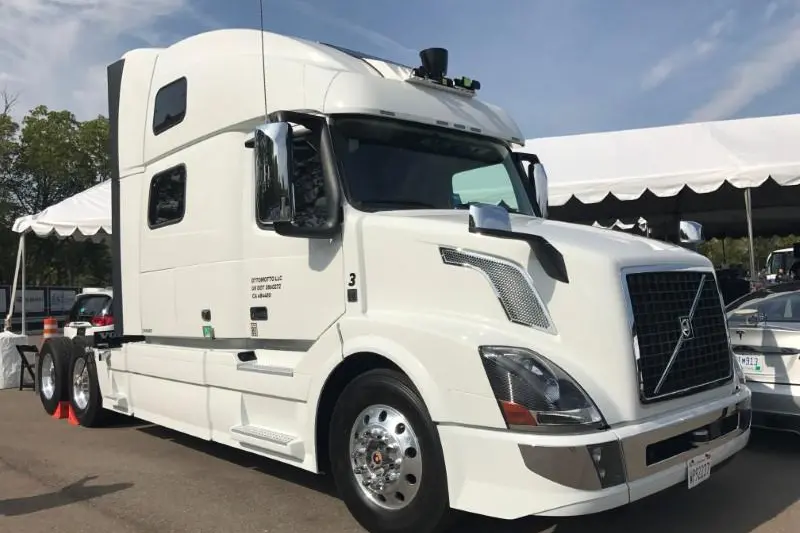PHOTO
Over three quarters (82 per cent) of GCC transport companies who took part in a recent survey said they expect autonomous trucks to become a viable option within the next decade while 35 per cent believe they will be a reality on our roads in the next five years.
Meanwhile, 57 per cent of the transport companies in the GCC view geopolitical uncertainty as the biggest threat to their development, said the research from the World Road Transport Organisation (IRU) highlighting the importance of innovation in road transport.
Additionally, they view technology and innovation as a key to overcoming challenges and securing the future of the industry.
As such, during the opening of its World Congress, IRU, the world road transport organisation, urges the industry to fix the digital foundations of transport in order to fully benefit from automation and other innovations.
Umberto de Pretto, IRU’s secretary general, commented: “The global transport system touches the lives of each of the planet’s seven billion people, from the food we eat to the consumer goods we buy. So it’s perhaps not surprising that many of the issues facing society today are also considered by transport companies to be their biggest challenges. These include some of the main themes that dominate the international agenda, including geopolitics, trade and the environment.
Tech to provide a safe, successful, sustainable future
Transport companies recognise that developments in technology and innovation will be key to building a safe, successful and sustainable industry in the future. Nearly one in three (36per cent) of GCC transport companies believe that improving safety will be the biggest innovation opportunity (a feeling mirrored by their peers across the world).
The survey also citied that companies within the region look to technology to boost productivity and help operators become more sustainable and environmentally-friendly, while one in five cite automation.
When it came to safety, companies within the GCC are particularly enthusiastic about the possibility of innovation improving safety while driving (91per cent). They are also enthusiastic about intelligent transport systems that could reduce hard driving conditions and opportunities to improve trip organization for drivers. 83per cent of GCC companies are also interested in technology’s potential to connect drivers, creating a sense of community.
Within the GCC, 82 per cent of companies believe that new digital platforms for vehicles as well as telematics on board vehicles 79 per cent are both ways technology could boost productivity. With views on technology’s impact on sustainability and environmentally-friendly practices, the biggest opportunities were in engine efficiency (89 per cent), decarbonisation in transport (79 per cent) and enhancing intermodal transport (75 per cent).
In fact, transport companies are extremely optimistic about the timescales for automation 82 per cent of transport companies expect autonomous trucks to become a viable option within the next decade; of these, 35 per cent believe they will be a reality on our roads in the next five years. Worldwide, transport companies believe the primary benefit of automation will be boosting productivity (50 per cent), followed by helping to cut costs (19 per cent).
Breaking through the road blocks to digitisation
Barriers to adopting technology persist – with GCC transport companies citing a limited understanding of the range of technologies available (62 per cent), followed by a lack of training to leverage such skills among employees (57 per cent) and the high level of investment required (53 per cent).
This suggests that pockets of the industry have yet to embrace new technologies and processes, and that there is still work to do to fix the digital foundations of the industry before technology-driven innovation can be optimised properly.
Gearing up for automation
Similarly, while many GCC transport companies believe autonomous trucks are just around the corner, the reality is that there is still some way to go before they become a safe, secure and sustainable option on our roads.
While the technology itself is becoming ever more sophisticated, there is a risk that it will be held back by the lack of necessary investment in infrastructure.
Boris Blanche, IRU’s managing director, commented: “There is no question that autonomous trucks will eventually be transformative for the industry – helping boost productivity, create efficiencies and enhance driver working conditions. But drivers will not become obsolete any time in the future, and in fact the industry must continue to encourage more drivers into the profession. Proper and responsible adoption over time is required, and we must see full cooperation from all industry stakeholders.”
Umberto de Pretto continued: “For technology to take hold, and for the industry to truly benefit from it, we must ensure we have the foundations in place. This means first getting the basics right, such as full transitioning to digital documentation, improving traceability, security and efficiency. We must work harder to join the dots between operators, service providers, manufacturers and governments to nurture a supportive environment for innovation and digitisation.
“We must also push for legislation and policies that encourage all operators to invest in the technology needed to make these innovations the norm. At IRU, our role is to champion the potential of the industry and promote this cooperation, to empower all operators in the sector to seize the great innovation opportunity.”
IRU is the world road transport organisation, promoting economic growth, prosperity and safety through the sustainable mobility of people and goods. Founded in 1948, IRU has members and activities in more than 100 countries. – TradeArabia News Service
© Copyright 2014 www.tradearabia.com
Copyright 2018 Al Hilal Publishing and Marketing Group Provided by SyndiGate Media Inc. (Syndigate.info).





















